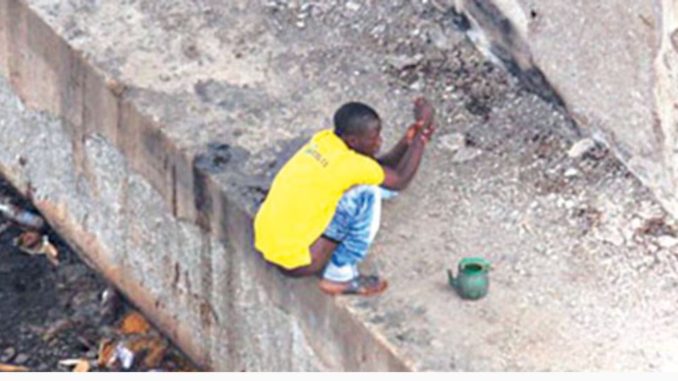
IT is taking too long for Nigeria to eradicate the repulsive custom of open defecation. Available statistics of the stench are undeniable: the country ranks as the second worst afflicted in the world among places where the practice is pervasive. Besides, a recent nationwide appraisal by the Water, Sanitation and Hygiene, an arm of UNICEF, depicts a depressing situation.
Essentially, people in 32 of the 36 states in the country are highly susceptible to epidemics because defecating publicly is rampant in all of them. There is no more excuse for this absurdity in the 21st Century.
The National Outcome Routine Mapping survey by WASH is scandalous for a country with so much untapped water resources. Out of the 774 Local Government Areas, only 12, spread through four states, were free of the scourge as of the first quarter 2019. Cross River – the only state in the South – is the clear leader with seven LGAs open defecation-free; followed by Bauchi and Jigawa with two LGAs each and Benue with one. In essence, 762 LGAs are still contending with the practice. This is a staggering number; it renders the residents of these communities vulnerable to preventable diseases.
The practice exerts a lot of pressure on the country, especially in aspects of planning, funding and implementation. In monetary terms, UNICEF estimates that Nigeria incurs a loss of N455 billion or one per cent of its GDP annually due to poor sanitation. A slice of this money would achieve good sanitation in time.
Many communities, particularly in the countryside, suffer from lack of water for sanitation. Toilets are scarce, and where available, are in despicable condition because of poor maintenance. It is a luxury to see sanitation facilities in public places within cities, let alone on Nigeria’s expressways. Places such as hospitals, government offices, worship centres, security facilities, schools, hostels and recreation centres are not left out of the acute deficiency. In urban centres, houses are still being erected without toilet facilities. Public taps no longer exist. At refuse dumps, markets, schools and roadsides, the disgusting odour from open defecation is ever present.
Nigeria has the second worst open defecation record globally – after India. A World Health Organisation/UNICEF report stated that, as of 2012, 34 million Nigerians were defecating without using toilets. With little being done, it rocketed to 47 million Nigerians by 2018. Roughly, this means one in four Nigerians has no access to toilets. Nigeria has thus dropped behind Indonesia, Pakistan and Ethiopia, who were second, third and fourth behind India in 2012. This ought not to be so.
For this, the country is paying heavily. UNICEF stated that about 122,000 Nigerians, including 87,000 children under the age of five, die each year from diarrhoea and other sanitation-related diseases. Millions more suffer the ill effects of open defecation, battling with typhoid fever, viral hepatitis, cholera, polio, dysentery, stunting, malnutrition and respiratory diseases. Women who engage in it are susceptible to snake bites and rape, say health experts. It underlines a joint report by WHO and UNICEF, which states that, to safeguard the people’s health, there should be no human contact with excreta.
Conversely, there is improvement in other places. In this, China has made the most progress to end defecating openly. UNICEF stated that the world’s most populous country accounted for 95 per cent of the progress made in sanitation in Eastern Asia as of 2012. For Nigeria, it is the reverse. The country had 66 million people without access to drinking water in 2012, but as of 2018, the number had increased to 77 million. So, the challenge before Nigeria is huge.
The Federal Government, which in March set an ambitious target of 2025 to eradicate the scourge, must therefore chart a new, faster direction and demonstrate an undying commitment to fight open defecation. The groundwork being laid in Ekiti, Anambra and Kaduna states should be intensified and pursued to a logical conclusion.
Ekiti, which ranks second as the most afflicted state in open defecation, has already enacted laws to mitigate the practice. Apart from directing each house in the state to erect toilets and implement water projects, nine offenders were convicted of the offence in April, although they escaped with the option of fines. Four offenders, who did not provide toilets in their houses, were arrested on Tuesday. In Anambra, the WASH project has executed potable water and toilet facilities at random, leading to the cessation of open defecation in many small communities. In late May, Kaduna, in conjunction with UNICEF, launched a roadmap to check the practice. Traditional rulers, religious leaders and public officials were integrated into the project.
With this in mind, the United Nations has set a deadline of 2030 to bring it to a closure, making the eradication of open defecation the sixth of its 17 Sustainable Development Goals. The three tiers of government should collaborate with UN agencies, the European Union and other multilateral organisations in the forefront of fighting the nuisance.
Entrenched human habits could be difficult to renounce. To curb this menace, LGAs, states and the Federal Government should implement pragmatic strategies against it. First, these governments should invest in toilet facilities. For new building projects, the provision of toilets should be made compulsory. Lagos, which mandated houses, restaurants and petrol stations to erect public toilets, should ensure that the policy works. These levels of government should embark on sustained awareness campaign on the implications of open defecation.
Eventually, punishment should be prescribed for persistent offenders so that the 2025 target can be attained.
END

Be the first to comment